Little Overview
Neuroscience in Bordeaux has grown over the last 10 years to become one of the largest scientific communities in the field of Neuroscience in France and in Europe, with over 650 people working in various CNRS, INSERM and INRA labs at the Universities of Bordeaux which are grouped in a virtual Institute called ” Bordeaux Neurocampus “
 Bordeaux Neurocampus Federation was founded by the ex University Bordeaux Segalen to promote interdisciplinary dialogue and research between the various neuroscience laboratories on the campus. Bordeaux Neuroscience coordinates the wide cross-disciplinary expertise and facilities and its clinical neuroscience partners in the hospital, and is engaged in developing ambitious training programs and conference series for the local and world-wide neuroscience research community.
Bordeaux Neurocampus Federation was founded by the ex University Bordeaux Segalen to promote interdisciplinary dialogue and research between the various neuroscience laboratories on the campus. Bordeaux Neuroscience coordinates the wide cross-disciplinary expertise and facilities and its clinical neuroscience partners in the hospital, and is engaged in developing ambitious training programs and conference series for the local and world-wide neuroscience research community.
Neuroscience research in Bordeaux has become over the last 10 years one of the most productive and attractive community across France and Europe, with 46 research groups organized in institutes and research units affiliated to the CNRS, the INSERM and the INRA.
Bordeaux Neuroscience laboratories are particularly successful in fields such as synapses, addiction, cognition and memory, Alzheimer’s disease, movement physiology and disorders, neuro-imaging, neuroinflammation, neurophotonics, nutrition and the brain…
More information about the labs, researchers, conferences on the website of the Bordeaux Neurocampus : https://www.bordeaux-neurocampus.fr
Institutes of Bordeaux Neurocampus Federation
IINS : Interdisciplinary Institute for Neuroscience
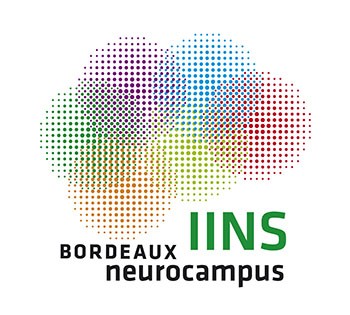
The IINS unite researchers with diverse areas of expertise, and create a highly synergistic environment to promote the development of initiative methods and investigation tools, especially those based on molecular biology, physiology, optics, chemistry, physics and computer science.
The application of such tools to push the boundaries of the study of molecular events underlying the activity of the brain. This includes studying the morpho-dynamic and functional properties of the nervous system to understand the complexity of its molecular assemblies and functions at an integrated level.
IMN : Institute of Neurodegenerative Diseases
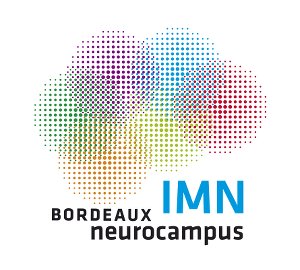
The Institute of Neurodegenerative Diseases (IMN) aims to encompass fundamental, preclinical, and clinical research in the field of neurodegenerative diseases, with the goal of developing therapeutic approaches to neurodegenerative diseases using both vertical and translational approaches.
The unique combination of clinical-relevant experimental models, ranging from in vitro simplified preparations to behaving non-human primates, and of a highly dynamic clinical research allows IMN to actually achieve the bench-to-bedside chain of research development.
INCIA : Cognitive and Integrative Neuroscience Institute of Aquitaine
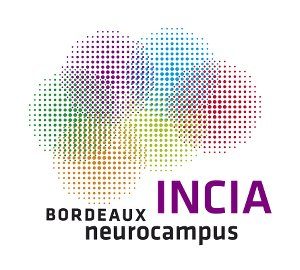 The INCIA federates 12 teams working in the fields of cognitive and integrative neuroscience with a focus on three main themes, Motricity, Motivation, and Cognition. Studies range from animal models to human clinical research using innovative methods in molecular biology, electrophysiology, imaging, animal behavior, psychophysics, and clinical investigation.
The INCIA federates 12 teams working in the fields of cognitive and integrative neuroscience with a focus on three main themes, Motricity, Motivation, and Cognition. Studies range from animal models to human clinical research using innovative methods in molecular biology, electrophysiology, imaging, animal behavior, psychophysics, and clinical investigation.
NCM : Magendie NeuroCenter
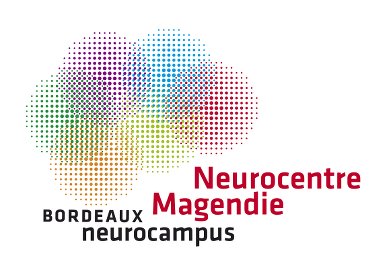
The Magendie NeuroCenter is an Inserm research center, who focus on the understanding of the physiopathology of brain diseases, in other words they study the mechanism leading to the appearance of behavioral and neurological pathologies.
The Magendie NeuroCenter analyses the pathophysiology of the brain integrating all its levels of activity such as : i. the molecular level, to study the modifications inside the neuronal cell; ii. the network level, to understand the modalities of communication between the cells of the central nervous system; and iii. the behavior level to analyse several pathological conditions, including motor disorders, neuropathies, autism, anxiety, depression, addiction and obesity.
NutriNeuro : Nutrition and Integrative Neurobiology Laboratory
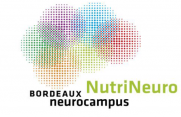
The NutriNeuro unit researchers study the impact of lipid nutrition on brain function(s) and the development of mood and cognitive disorders using state of the art multidisciplinary approaches from molecular biology to behavior.
Their general hypothesis is that lipidic nutritional imbalances contribute to the development of cognitive and mood disorders, due to their effects on the pathophysiological processes involved in these disorders. The ambitious and innovative character of their project relies on their capacity to conduct translational research both in rodent models and humans in the emerging field of nutrition and Neuroscience.
SANPSY : Sleep Attention and Neuropsychiatry
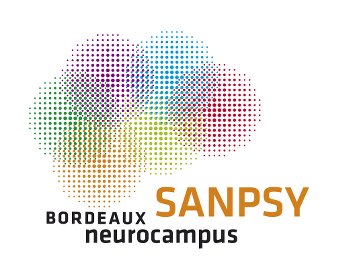
SANPSY is a joint CNRS service and research unit working at redefining the frontier between normality and pathology in the field of sleep, attention, addiction, attention-deficit hyperactive disorder and new psychiatric disorders. Their major focus is on interindividual vulnerabilities to sleep loss, attention deficits and addictions.
They used epidemiological studies to identify associations between these symptoms and/or disorders and cognitive/behavioral handicaps. Experiments conducted in a sophisticate research platform, combining EEG, virtual reality and cognitive psychology, aims to confirming causalities suspected in the epidemiological attention deficits and addictions.
Platforms of Bordeaux Neurocampus Federation
BIC : Bordeaux Imaging Center
 The BIC offers resources in photonic and electronic imaging, mainly in life, health and plant sciences? It is a core facility identified at the national level as “infrastructure en Biologie Sante et Agronomie” (IBISA) and part of the Center for functional Genomics of Bordeaux.
The BIC offers resources in photonic and electronic imaging, mainly in life, health and plant sciences? It is a core facility identified at the national level as “infrastructure en Biologie Sante et Agronomie” (IBISA) and part of the Center for functional Genomics of Bordeaux.
The BIC offers access to classical and the most advanced bio-imaging techniques for fixed and live cell imaging, video-microscopy, confocal microscopy, multiphoton imaging, transmission electron microscopy and scanning electron microscopy. It provides extensive training for internal users as well as for international visitors through organization of year round theoretical and hands on courses in all fields of cellular imaging. The BIC also provides a unique set of high-end equipment for super-resolution microscopy such as confocal STED microscopy, PALM Microscopy, FRAP video-microscopy, Fluorescence lifetime imaging FLIM for the measurement of molecular interactions.
PAM : Movement Analysis Platform
 The Movement Analysis Platform is dedicated to fundamental research, clinical research and diagnosis. The technical area takes place in the Cognitive and Integrative Neuroscience Institute of Aquitaine (INCIA) in Bordeaux.
The Movement Analysis Platform is dedicated to fundamental research, clinical research and diagnosis. The technical area takes place in the Cognitive and Integrative Neuroscience Institute of Aquitaine (INCIA) in Bordeaux.
The aim is to provide a fully integrated setup of human movement analysis tools to researchers in neuroscience, psychophysics, kinesiology and ergonomic, and to clinicians in rehabilitation, neurology or orthopaedic. In fine, the purpose is to offer the largest choice in determination and realisation of experimental protocols.
The platform is approved for biomedical experiments on humans, and a specific area is also dedicated for the analysis of the animal motor skills. The motricity is assessed in various ways such as, assessment of motor skills and their adaptation; assessment and validation of therapeutic methods and rehabilitation protocols; evaluating of training methods and performance; modelling and numerical simulation of movement; assessment and development of prosthetic equipments and rehabilitation devices; Interaction subject/environment with virtual reality tools.
OptoPath
OptoPath is a rodent platform for an innovative experimental psychopathology, coupling high face validity behavioral models and cutting edge neurobiological tools for a dimensional transnosographic approach for major public health concerns.
In the context of OptoPath projects, their objectives is to create and innovative platform coupling new high face validity behavioural models of psychopathologies to cutting edge tools for recording and manipulating brain activity in behaving rodents. Their project involves a close collaboration between seven research academy groups and three industrial partners. The academy groups, belonging to the Magendie Neurocenter and the IMN, have complementary expertise from cell biology to experimental psychology. Their respective theoretical interest for addiction, obesity, memory and anxiety-related disorders allow considering a transnosographical investigation of four psychopathologies sharing common psychobiological dimension.
Going further : OptoPath
PhenoVirt
PhenoVirt is a virtual reality platform for phenotyping healthy subjects and patients and create virtual reality tools in medicine, education, transport and embedded system for pilot supervision.
This project aims to develop the neuropsychopharmacology platform (PNPP) a virtual reality area combining multidisciplinary expertise (psychiatry, neuropsychology, physiology, cognitive psychology) for phenotyping healthy subjects and patients. This platform is designed: i. To understand the human characteristics accounting for the vulnerability or resistance to fatigue, sleepiness, attention deficit disorders and pathological cognitive decline in elderly; ii. To identify predictors of the onset of distraction, fatigue and/or sleepiness in human in the world of transportation and work; iii. To test behavioral, pharmacological and technical countermeasures to restore cognitive performance of healthy and pathological subjects exposed to stress, fatigue and sleepiness, and pathological subjects in situations simulating daily life, work or transportations; iv. To produce new tools (cockpits, simulators, scenarios, systems of supervision) marketable in collaboration with industrial partners.
Going further : PhenoVirt
